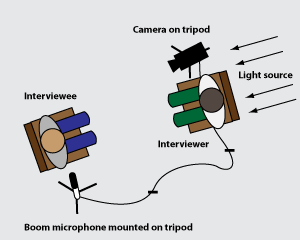How to Produce a Podcast
Academic podcasts are a useful tool for public engagement and a cheap way to reach new audiences. Here, Andreas Müllerleile, explains how to get started with your first audio or video podcast. Surprisingly, there are relatively few podcasts on European politics or EU affairs! Podcasts are hugely popular (for example among commuters and journalists) and can be a cost-effective tool to reach a wider audience if disseminated via platforms such as iTunes, Soundcloud or YouTube.
 Example setup for a one-on-one video interview
Example setup for a one-on-one video interview
Audio or Video?
If you are new to podcast production it may be easiest to start with an audio podcast. The production costs are rather low; a good microphone and free audio editing software (for example audacity) are sufficient to produce a good quality audio podcast. Increasingly, smartphones can be used to record interviews although external microphones should be used to achieve a good sound quality.
Video podcasts are a bit more complex to produce as editing videos generally takes longer and setting up the recording equipment can be more challenging. The key is a good camera, a tripod, microphones and a professional attitude to get it right. There are various free software packages available that allow you to do editing and post-production work. However, shooting videos from different angles in a setting that looks professional can take time and requires some practice – this also applies to post-production. If you consider starting an academic video podcast do check the various academic YouTube channels to get a feeling of the good, the bad or the ugly (academic) video content. Before starting a video podcast, make sure you have a concept that works and the professional resources necessary to produce it regularly.
As a general rule, audio podcasts are easier to produce and can sound more professional without having to spend a fortune on equipment.
Planning your Podcast
A podcast production needs to start with a decision on the format. Podcasts can either follow an interview or a conversational format; the former involves a host and guests, the latter is a more informal discussion between several people on a chosen subject. However, both formats need some scripting, i.e. deciding on topics, questions and a plan that defines the general flow or structure of the conversation or interview. The perfect length of a podcast is another consideration. A short podcast (10 min) is a good format for a quick interview; longer more conversational formats can last around 30 min. Event recordings can also be used as a source of interesting content.
It is also helpful to decide on where you will conduct the recording of your podcast; a quiet space where you won’t be interrupted is best. If available, you might look at booking a room at your university beforehand. Perhaps also consider taking along some water for guests – especially if recording a longer format session.
When deciding on the format of your podcast it is important to also consider the amount of time you will have available to produce it. As well as recording your podcast, you will need to leave time for other tasks, such as getting your podcast online and then marketing it – this is essential if you actually want your podcast to be listened to or watched. It may be helpful to write a list of all the tasks involved in the production of your podcast along with an estimate of how long each one will take to complete. This will help you to end up with a finished product and not just an audio/video file languishing on your computer’s hard drive.
Deciding on a Topic for your Podcast
The content of a podcast on EU affairs could range from discussions or interviews on current EU affairs but could also include book reviews or educational segments such as ‘EU facts of the week’, or ‘EU Law for Dummies’ or a short explanation of a certain EU related process or phenomenon (for example ‘How does the European Parliament work’, ‘What is comitology’, ‘Can the ECB save the euro?’). Be creative when it comes to deciding on topics. Of course, podcasts can also be used to discuss research findings. However, here you need to consider that you may have a non-expert audience, so make sure you explain issues as clearly as possible or link them to current affairs.
A podcast can be an innovative tool to showcase the research expertise of an entire university department. It could also be the basis for collaboration with campus radio stations or media studies departments. However, the key is to think like a radio journalist when it comes to asking questions or framing an issue. If necessary repeat questions and use the best answer in the podcast. It may be useful to look for training opportunities or professional advice before starting a podcast. If the podcast is supposed to reflect the department you may need to present the idea to the management or the communication department of the university. Lastly don’t forget, producing a podcast can be a fun way to engage with research and communicate it to a wider audience.
By Andreas Mullerleile

